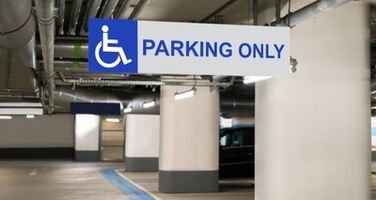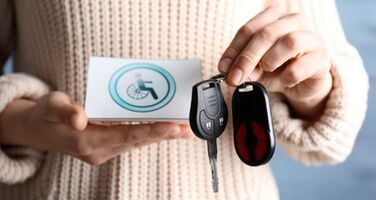
Exploring the Different Types of Handicap Placards in Delaware
Introduction
Handicap placards play a crucial role in enhancing accessibility and ensuring equal rights for individuals with disabilities. In Delaware, there are different types available, each serving a specific purpose and catering to the unique needs of individuals. Understanding the different types and their associated benefits is essential for both individuals with disabilities and those who support them. In this article, we will provide a comprehensive overview of the various handicap placards in Delaware, including the eligibility criteria, application process, and privileges. Let's delve into the details and explore the different types of handicap permits in Delaware.
Types of Handicap Placards
Handicap permits in Delaware can be categorized into four types: Standard, Temporary, Permanent, and Organizational. Each type serves a specific purpose and duration.
Standard
It is the most common type issued in Delaware. It is designed for individuals with long-term disabilities that significantly impair their mobility. This is valid for a period of up to five years and must be renewed upon expiration.
Temporary
Individuals with temporary disabilities that affect their mobility can apply for a temporary permit. This is valid for a maximum of six months and are ideal for individuals recovering from surgeries or injuries that limit their mobility temporarily.
Permanent
Individuals with permanent disabilities that substantially impair their mobility can obtain a permanent one and is valid for five years, after which it must be renewed. It is suitable for individuals with chronic conditions such as paralysis or severe orthopedic impairments.
Organizational
These are issued to institutions, establishments, or organizations that transport individuals with disabilities. These are valid for five years and allow designated vehicles to park in accessible parking spaces while providing transportation services to individuals with disabilities.
Qualifying Conditions
To be eligible for a handicap permit in Delaware, individuals must have a qualifying medical condition that meets the criteria set by the Division of Motor Vehicles (DMV). Common qualifying conditions include:
- Loss of use of one or both legs
- Inability to walk 200 feet without assistance or the use of a mobility aid
- Cardiovascular conditions limiting mobility
- Severe lung diseases
- Visual impairments
Applying for a Handicap Placard
To apply for a disability permit in Delaware, individuals must complete the Application for a Disability Parking Placard or License Plates form. This form can be obtained from the DMV website or local DMV offices.
Eligibility Criteria for Handicap Placards
To determine eligibility, the DMV requires medical certification from a licensed healthcare professional, such as a physician, nurse practitioner, or physician assistant. The medical professional must certify the qualifying condition and the expected duration of the disability.
Documentation Required for Handicap Placards
When applying, individuals need to provide supporting documentation, including:
- Completed Application for a Disability Parking Placard or License Plates form
- Medical certification from a licensed healthcare professional
- Proof of identification (e.g., driver's license or state-issued ID card)
Application Process
The completed application form and supporting documents must be submitted to the local DMV office. The application can be submitted in person or by mail. The DMV will review the application and verify the information provided.
Processing Time
The processing time for handicap placard applications varies, but it typically takes between 7 and 10 business days. It is advisable to submit the application well in advance to ensure the permit is received in a timely manner.
Fees for Handicap Placards
There is no fee. However, if an individual requires disability license plates in addition to the permit, standard registration fees apply.
Renewal
Permits must be renewed before the expiration date. To renew, individuals need to complete the Application form and submit it to the DMV. Renewal can be done in person or by mail.
Replacement
In case of loss, theft, or damage, individuals can request a replacement. To obtain a replacement, individuals must complete the Application form and submit it to the DMV. There is no fee for replacement.
Privileges and Benefits
Delaware handicap placards offer several privileges and benefits to individuals with disabilities. These include:
- Accessible parking spaces close to building entrances
- Extended parking time in metered areas
- Exemption from parking fees in certain locations
- Reduced distance to walk from parking spaces to destinations
Accessible Parking Spaces
Accessible parking spaces are specifically designated for individuals with disabilities. These spaces are wider than regular parking spaces and are located closer to building entrances. The goal is to provide easier access and accommodate mobility aids such as wheelchairs and walkers.
Handicap Placard Abuse
Handicap pass abuse is a serious issue that undermines the accessibility rights of individuals with disabilities. It involves the misuse by individuals who do not qualify for them. Such abuse can lead to limited parking availability for those who genuinely require the spaces.
Reporting Handicap Placard Abuse
If you suspect an abuse in DE, it is crucial to report it to the appropriate authorities. Contact the local law enforcement agency or the Delaware DMV and provide them with the necessary details to initiate an investigation.
Frequently Asked Questions (FAQs)
Q: How long does it take to receive a disability pass in Delaware?
The processing time for applications in DE is typically between 7 and 10 business days.
Q: Can I use my disability pass in other states?
Yes, passes issued in DE are generally recognized in other states. However, it is advisable to check the specific regulations and requirements of the state you are visiting.
Q: Can I lend my disability pass to someone else?
No, it is non-transferable and can only be used by the person to whom they are issued. Lending it to someone else is considered misuse and can lead to penalties.
Q: Do I need to renew my disability pass?
Yes, it must be renewed before the expiration date. Failure to renew may result in being considered invalid.
Q: Can I park in any space with a disability pass?
No, disability passes allow parking in designated accessible parking spaces. It is important to park only in spaces marked with the appropriate accessibility signage.
Q: Can I use a disability pass if I am driving someone else with a disability?
Yes, it can be used when transporting individuals with disabilities. The holder must be present in the vehicle during its use.
Conclusion
Handicap permits play a vital role in ensuring accessibility for individuals with disabilities in DE. By understanding the different types of placards in Delaware, eligibility criteria, application process, and privileges, individuals can navigate the system effectively and enjoy the benefits they offer. It is important to respect the proper use and report any instances of abuse to preserve equal rights and accessibility for all.
.png)






